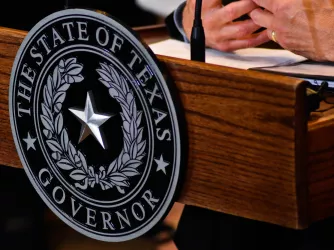Table of Contents
Best of ‘The Torch’: Wisconsin: Why Tenure and Shared Governance Matter

This article is part of FIRE’s “best of” retrospective, where we revisit the most memorable Torch moments from the past year. This article originally ran June 10, 2015. Unfortunately, the misguided proposals discussed here have since become law. Despite the fact that these changes have only recently gone into effect, FIRE already has concerns about academic freedom at UW-Madison.
Wisconsin: Why Tenure and Shared Governance Matter
Tensions are running high in Wisconsin’s system of higher education, as the state’s legislature recently moved closer to etching into reality proposals that could result in $250 million in cuts to the University of Wisconsin System’s budget. This alone is dramatic, but in addition to the potential cuts to the system’s budget, proposals are also in place to weaken protections both for faculty tenure and shared governance. These latest developments have sparked concern that academic freedom in the UW System suddenly faces threats to its long-term health.
FIRE shares those concerns.
Wisconsin is unique in that provisions concerning faculty tenure and shared governance are codified directly into state law. This past January, Governor Scott Walker proposed to modify, if not strike entirely, these provisions. Concern over what the proposal could mean for faculty was kicked into high gear by the legislature’s Joint Committee on Finance, which on May 29 voted 12-4 to approve an omnibus motion that, though lowering Walker’s proposed cuts over two years from $300 million to $250 million, also proposed new measures that pose potential threats to academic freedom. Faculty groups are particularly concerned with provision 39 of the motion, which proposes to:
Modify current law to specify that the Board [of Regents] may, with appropriate notice, terminate any faculty or academic staff appointment when such an action is deemed necessary due to a budget or program decision regarding program discontinuance, curtailment, modification, or redirection, instead of when a financial emergency exists as under current law.
If passed into law, the proposal would make it far easier to remove tenured faculty. Terminating such faculty would no longer be solely a last resort to be taken only when finances are tapped or in response to serious academic misconduct or criminal activity. Instead, the Board of Regents could simply cite a vague desire for a program’s “redirection” or “modification”—whatever that may mean in practice—to justify firing an outspoken, dissenting, or simply inconvenient faculty member. The threat to academic freedom is obvious.
The omnibus motion also contains concerning language on shared governance that demotes faculty to having merely an advisory role in university affairs, rather than figuring centrally as they traditionally have. Specifically, provision 35 calls to “[d]elete current law specifying that the faculty of each institution be vested with responsibility for the immediate governance of such institution and actively participate in institutional policy development.”
The University of Wisconsin-Madison faculty organization PROFS (standing for Public Representation Organization of the Faculty Senate) expressed alarm at the development, stating that “it would be difficult to overstate how destructive and unnecessary the JFC’s proposed changes to tenure and shared governance are.” A separate group of roughly 500 (and counting) UW-Madison faculty, including longtime FIRE ally Donald Downs, signed a petition calling attention to provision 39 as well, writing:
If passed into law, this provision would greatly weaken any guarantees of tenure provided by the Board of Regents. In essence, state statute would say that tenure at the University of Wisconsin does not mean what it means at every other institution: a guarantee that university administrators cannot arbitrarily dismiss faculty who have earned tenure through research, teaching, and service.
The petition’s signatories also express concern for the future of shared governance in the UW system, highlighting a number of areas—including matters of free speech on campus—where faculty input on university policy has proved crucial:
In recent years, [shared governance] has helped to improve policy in numerous areas—from elimination of speech codes to reorganizing the Graduate School. Far from inhibiting change, shared governance is part of the way that the University of Wisconsin has effectively adapted to changing circumstances.
Some officials have downplayed the proposal’s potential impact. UW-Madison Chancellor Rebecca Blank promised that the changes were “not the disaster that some people want to portray” and wrote that UW-Madison has “steps that we can take that I believe can put in place tenure protections that will be the equivalent of any of our peers.” The UW System president and Board of Regents vice president have likewise stated that the UW System will not waver in its commitments to tenure and shared governance. Indeed, the Regents did vote to adopt a new tenure policy last week—though they declined to mount a concerted challenge to the legislation itself should it pass, to the criticism of many faculty. Where previously Wisconsin was the only state to enshrine tenure’s protections in state law, there is a fear now that the pendulum may be about to swing significantly in the other direction, with considerably weaker protections for tenured faculty compared to their peers suddenly having the force of law.
FIRE takes no position on what the ideal tenure policy is or how one should look or function, or whether tenure’s protections should be codified into state law. This doesn’t lessen our recognition of the role tenure has played in securing the rights of university faculty members around the country. In our fifteen years defending individual rights on campus, FIRE has fought and won cases on behalf of numerous tenured faculty members, and it is safe to say that but for their tenure, several of them would likely have faced unjust termination for protected speech simply because their universities would have thought they could get away with it. On the other end of the spectrum, FIRE has seen the destructive effects that not having tenure has had on faculty rights, both in terms of faculty scholarship and the lack of security with which non-tenured faculty may exercise their First Amendment rights as faculty and as private citizens.
Tenure isn’t a cure-all, and it alone doesn’t guarantee academic freedom. FIRE will fight for academic freedom regardless of whether the current system of tenure remains in place, erodes, or is eliminated altogether. But we note that tenure is available to fewer and fewer faculty, and more courses than ever are taught by adjuncts who have no prospects of tenure. Many universities will claim that academic freedom is blind to whether one is tenured or not, and FIRE believes this should be the case. But that hasn’t been our experience on the ground. Instead, the less job security a professor has, the less academic freedom he or she tends to enjoy—which speaks both to the utility of tenure and the scandalously unstable conditions of adjunct faculty when it comes to academic freedom. Yet even having tenure, as we’ve seen over and over, doesn’t offer blanket protection from chilling assaults on academic freedom.
Shared governance, like tenure, isn’t something upon which FIRE takes any single position, though it is an institution whose good has shown itself to be self-evident. As the previously described faculty petition noted, the UW System faculty have been a consistent voice against unconstitutional speech codes. Faculty members also helped enact the admirable statements on freedom of expression and academic freedom adopted this year at the University of Chicago, Princeton University, and Purdue University. Elsewhere around the country, faculty have been the voice of reason in the face of serious administrative challenges to faculty rights. At Harvard Law School and the University of Pennsylvania Law School, sizeable contingents of the law faculty have fought back against chilling new Title IX regulations that they recognized as posing grave threats to the due process rights of students accused of sexual assault.
Faculty members aren’t perfect, but they have frequently stood up for the principles of freedom of expression when administrators failed to do so. They’re also naturally positioned to hold their universities to account when administrative decision-making implicates academic freedom. This is not an area where the faculty role in governance can afford to be watered down; indeed, on multiple occasions FIRE has seen the faculty’s role in governance systematically ignored by administrations determined to pursue their own brand of discipline.
The University of Denver, for example, declared longtime tenured professor Arthur Gilbert guilty of having created a hostile environment in large part on the basis of his teaching and course materials, ignoring the criticisms of multiple faculty committees condemning Gilbert’s treatment and refusing to consider Gilbert’s academic freedom considerations, as it was obligated to do. Appalachian State University entirely ignored the input of two faculty committees and departed so wildly from its written procedures that it effectively created new policy on the spot, absent faculty input, when it declared sociology professor Jammie Price guilty of a similar offense. Most recently, there’s the highly-publicized case of Professor Laura Kipnis at Northwestern University, who endured a 72-day Title IX investigation based on an essay she wrote for The Chronicle of Higher Education and on a post to her Twitter account. Not only did Northwestern keep Kipnis in the dark even on basic details of its investigation, but a member of Northwestern’s faculty senate found himself the target of a complaint merely for criticizing the process as violating her academic freedom. No matter what commitments they make to shared governance, more and more universities are in practice treating the input of faculty as strictly advisory. What is going to happen when that dismissal becomes enshrined in law?
If the proposed changes to state provisions on tenure and shared governance are signed into law, we may not see drastic changes overnight, and it may be years into the future when their effects come home to roost. The UW System leaders and regents have promised that no matter what the legislature does, they will enshrine their own protections into UW System policy so that tenure and shared governance aren’t—on paper anyway—seriously affected, and remain on par with their peer institutions. That may turn out to be the case.
It won’t change the fact, however, that the legislature will have given UW System institutions more power to terminate tenured faculty and marginalize them in the governance process. No matter how good their intentions, it’s easy to imagine circumstances arising where universities will find that power convenient to have, and want to use it. For that, among other reasons, it’s hard to imagine a lot of good coming from these legislative changes, and easy to imagine a lot of bad.
Recent Articles
FIRE’s award-winning Newsdesk covers the free speech news you need to stay informed.

Gov. Greg Abbott’s order ‘hardening state government’ against China is dangerously hard to parse

Right, left, and in-between: Can we bring our differences to the table?

From the UK to Germany to Singapore: Police are watching what you post
